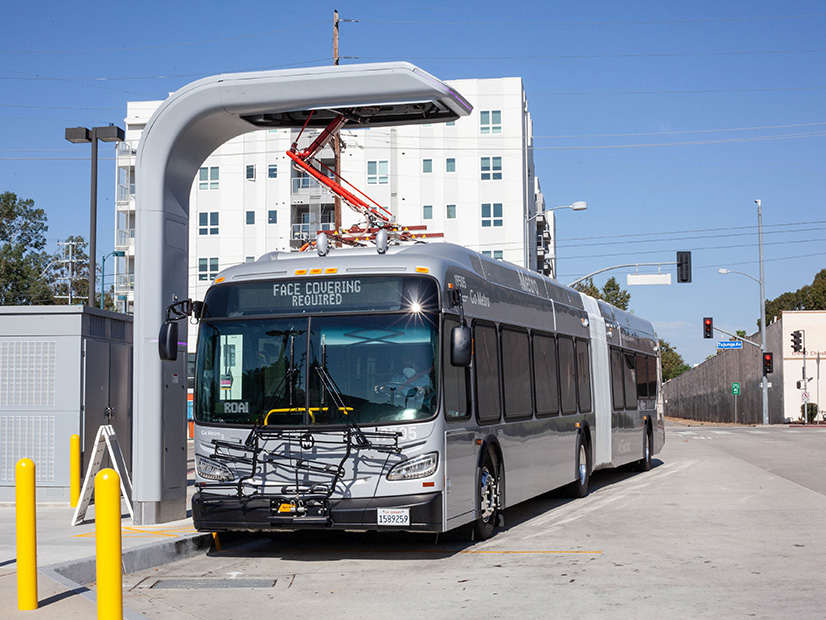The California Energy Commission allocated a major round of funding Wednesday to support the development of electric transit buses, school buses and medium- and heavy-duty electric trucks as the state tries to decarbonize its transportation sector.
The nearly $24 million in funding included a $6 million grant to the Los Angeles Department of Transportation to continue electrifying its transit bus system. The grant will enable LADOT to add a solar-plus-storage microgrid to provide clean energy and keep its electric bus fleet running, even during power outages. It will also fund four 1.5-MW chargers, 104 charger dispensers and overhead transit bus charging with solar canopies.
“The project will deploy electric bus charging infrastructure to support up to 142 battery electric buses,” Energy Commission Specialist Esther Odufuwa said. “LADOT’s strategy is to convert its entire fleet of buses to battery-electric zero-emission vehicles.”
The microgrid project, in a city as immense as Los Angeles, can serve as a model for smaller cities, Odufuwa said. There are approximately 11,500 transit buses operating statewide, she added.
“This microgrid technology has the potential to be completely replicable for all transit agencies in California, regardless of their of their size,” Odufuwa said.
If the state were to convert all transit buses to electric vehicles and operate them as bidirectional resources, they could discharge up to 700 MW of flexible capacity to support the state’s grid reliability efforts — enough electricity to power 700,000 homes, she said.
Commissioner Patricia Monahan, the lead commissioner for CEC transportation programs, said “this project has it all in terms of … electrifying buses and doing it in a way that’s attentive to the grid. We are really looking for those twofer opportunities where we get a benefit to the grid and a benefit to the transit district.”
The item passed unanimously.
The CEC also approved a $13 million grant to the nonprofit Electric Power Research Institute to fund a research hub focused on electric heavy-duty drayage trucks. Cal Start, a research and development organization for clean transportation, will act as a major subcontractor on the project.
“The research hub will advance high-power charging technologies and engage a broad network of stakeholders and communities to deploy public-access charging infrastructure for [medium- and heavy-duty] vehicles in heavily trafficked freight corridors,” the project description said.
The CEC gave eIQ Mobility, which provides fleet electrification services, $2.2 million to fund a demonstration project for bidirectional electric charging of school buses in the San Francisco Bay area.
A $1.7 million grant will fund the deployment of 300-kW wireless charging infrastructure for the SolanoExpress intercity bus service in Solano County in Northern California.
Smaller grants will fund planning for medium- and heavy-duty vehicle electric charging and hydrogen refueling stations and to develop a zero-emission transportation program for the 2028 Olympic Games in Los Angeles.
The California Energy Commission granted nearly $24 million Wednesday to foster zero-emission transit buses, school buses and medium- and heavy-duty trucks.



